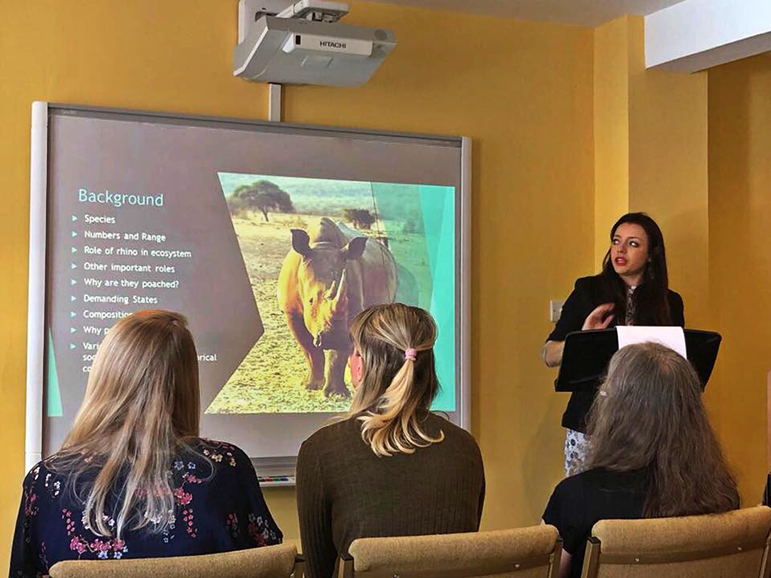Amy P. Wilson is an attorney from South Africa with a Master’s Degree in Animal Law and co-founder and director of the first Animal Law organisation in her country – Animal Law Reform South Africa (ALRSA). Soon she will take up a position as an Aquatic Animal Law Fellow at the Center for Animal Law Studies at Lewis & Clark Law School. Voiceless Animal Law and Education Manager, Dr. Meg Good, sat down with Amy to talk about the work of ALRSA and why animal law education in South Africa is so important.
Excitingly, you have established the very first non-profit organisation dedicated to animal law in South Africa – Animal Law Reform South Africa (ALRSA). Why are animal lawyers needed in SA, and what does ALRSA work on?
Animal lawyers are needed globally, but it is particularly pertinent that animals have lawyers in South Africa given the enormous exploitation and wide-scale abuse of our animals – by individuals, corporations and even government. These extend beyond our borders, have a major global impact for both human and nonhuman animals and have occurred largely due to lax laws and enforcement, vested interests and corruption. As lawyers, we are in a unique position to attempt to tackle some of these issues. We are also able to provide access to legal advice and services and assist the amazing work being done by organizations and individuals. Furthermore, given the difficulties and challenges facing the country and its human population, there is a need to recognize the major overlap between animal, human and environmental issues.
ALRSA was established to utilize the law to advance the protection of animals, but we also recognise the need to be holistic in our approach. We can’t just focus on animals – we need to and want to also focus on human and social justice issues. ALRSA’s focus areas are therefore animal wellbeing, law and social justice and we look to achieving change through legislative and policy reform, litigation and legal services, and education and research.

What are some of the highlights from your work at ALRSA?
There really have been so many highlights for me that it is hard to narrow down – the work is so varied and challenging – and I have been blessed to work with so many passionate individuals and organizations.
For the last two years we have assisted with the legal side of mass activist marches where memoranda were handed over to members of parliament. Last year’s efforts called on government to formally recognise animal sentience in legislation. Although not yet formally adopted, it put the item on the agenda and these efforts are ongoing. This year’s march and memorandum called for specific protections for South Africa’s wildlife – particularly elephants, rhinos and lions. Demands included banning specific practices, including NGOs in decision making and removing industry self-regulation, among others. Our wildlife is intensively farmed for their “parts” whether it be rhino horns, lion bones, ivory or otherwise and like other animals, the law fails to adequately protect them. This memorandum will be formally presented when parliament is in session in the next few months and we hope that government will hear our voices.
We also provided direct input on a proposed ban on cosmetics testing on animals. It was one of my first experiences having direct input into legislation before it was published (usually we only have the opportunity to comment during the public consultation). The proposal is still making its way through the parliamentary process, but we are hopeful it will materialize.
For your Masters Project at Lewis & Clark Law School in the US, you developed the first Animal Law Course for South African universities. What do you hope to achieve?
As the first South African to undertake the LL.M Program at Lewis & Clark, I made it my goal to make Animal Law education accessible in South Africa.
There are currently no animal law courses in Universities in South Africa and the idea behind creating a model curriculum was so that it could be used by others who wanted to teach it or learn about it. I hope that it will also assist legitimising the subject as a field of law, create awareness and jobs, and build capacity – whether this is lawyers or others.
Do you have any advice for budding law students who are keen to get involved in animal law?
Keep researching, learning and staying involved. Attend talks, connect with likeminded individuals and organisations and volunteer if possible! Take all opportunities that come your way – and if there aren’t any then create your own! Even if you decide not to pursue animal law full time – you can still incorporate it into your practice somehow. Don’t give up or be discouraged, sometimes it can be tolling mentally, emotionally and physically, but keep at it – animals need lawyers!
For more information, please see Animal Law Reform South Africa’s Facebook Page/Website.
Contact: amywilson@animallawreform.org
Voiceless Blog Terms and Conditions: The opinions expressed on the Voiceless Blog are those of the relevant contributors and may not necessarily represent the views of Voiceless. Reliance upon any content, opinion, representation or statement contained in the article is at the sole risk of the reader. Voiceless Blog articles are protected by copyright and no part should be reproduced in any form without the prior consent of Voiceless.


